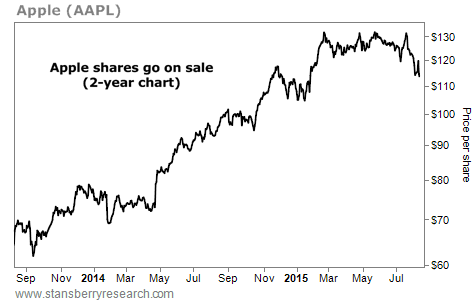| Home | About Us | Resources | Archive | Free Reports | Market Window |
|
Editor's note: Today, we're sharing a piece of timeless investing wisdom from our friend Chris Mayer. If you're looking to make big gains in the market, read on...
This Is How You Make Hundredfold Gains in the MarketBy
Wednesday, August 12, 2015
"Every human problem is an investment opportunity if you can anticipate the solution," the old gentleman told me. "Except for thieves, who would buy locks?"
I just met this remarkable fellow, full of wisdom on investing, yet hardly known beyond a small group of fans. His name is Thomas Phelps, and he's had quite a career. He was the Wall Street Journal's Washington bureau chief, an editor of Barron's, a partner at a brokerage firm, the head of the research department at a Fortune 500 company, and, finally, a partner at Scudder, Stevens & Clark (since bought out by Deutsche Bank).
Phelps retired in Nantucket after a varied 42-year career in the markets. Along the way, Phelps figured out a few things about investing...
He conducted a fascinating study on stocks that returned $100 for every $1 invested.
Phelps found hundreds of such stocks, available in any single year, that you could have bought and enjoyed a 100-to-1 return on – if you had just held on.
This was the main thrust of our conversation: the key was not only finding them, but keeping them.
His basic conclusion can be summed up in the phrase "buy right and hold on."
"Let's face it," he said, "a great deal of investing is on par with the instinct that makes a fish bite on an edible spinner because it is moving." Investors, too, bite on what's moving and can't sit on a stock that isn't going anywhere.
They also lose patience with one that is moving against them. This causes them to make a lot of trades and never enjoy truly mammoth returns. Investors crave activity, and Wall Street is built on it. The media feeds it all, making it seem as if important things happen every day. Hundreds of millions of shares change hands every session.
But investors need to distinguish between activity and results. "When I was a boy, a carpenter working for my father made this sage observation: 'A lot of shavings don't make a good workman.'" As you can see, Phelps is a man of folksy wisdom.
"Investors," Phelps continued, "have been so thoroughly sold on the nonsensical idea of measuring performance quarter by quarter – or even year by year – that many of them would hit the ceiling if an investment adviser or portfolio manager failed to get rid of a stock that acted badly for more than a year or two." What investors should do is focus on the business, not on market prices.
Phelps showed me financial histories of a long list of companies – earnings per share, returns on equity and the like. No stock prices. After one example, he asked, "Would a businessman seeing only those figures have been jumping in and out of the stock? I doubt it." But if they just sat on it, they'd be rich. And this is the nub of it.
Phelps is not a fan of selling good businesses. He talked about how his friend Karl Pettit – an industrialist, inventor and investor – sold his shares of tech firm IBM many years ago to start his brokerage business. He sold them for a million bucks. That stake would eventually go on to be worth $2 billion – more than he ever made in his brokerage business.
Phelps also told me the story of how he sold his shares of former filmmaker Polaroid to pay a steep doctor's bill of $7,415 back in 1954.
"Here is the confirmation of the sale," he said, and he keeps it as a reminder of his folly. Less than 20 years later, his Polaroid stock was worth $843,000. That's an expensive doctor's visit. Phelps also stands against market timing. He told me about how he predicted various bear markets in his career.
"Yet I would have been much better off if, instead of correctly forecasting a bear market, I had focused my attention through the decline on finding stocks that would turn $10,000 into a million dollars." Because of his bearishness, he missed opportunities that went on to deliver 100 to 1.
"Bear market smoke gets in one's eyes," he said, and it blinds us to buying opportunities if we are too intent on market timing.
"He who lives by the sword shall perish by the sword," he added. "When experienced investors frown on gambling with price fluctuations in the stock market, it is not because they don't like money, but because both experience and history have convinced them that enduring fortunes are not built that way."
Phelps showed me a little table that reveals how much and for how long a stock must compound its value to multiply a hundredfold:
You'll note these are very long holding periods – especially in an age when the average holding period for stocks is measured in months – but that's the point. The greatest fortunes come from gritting your teeth and holding on. You'll also see it's a fairly high hurdle to get to 100-bagger status. You need high growth for a long time. For example, farming-equipment store Tractor Supply grew earnings at a rate of 23% per year and became a 100-bagger after just over 12 years. Energy-drink maker Monster Beverage became a 100-bagger in just 10 years – a remarkable feat that required a 50% annual growth rate.
Phelps advises looking for new methods, new materials, and new products – things that improve life, that solve problems and allow us to do things better, faster and cheaper. There is also an admirable ethical streak to Mr. Phelps' style, as he emphasized investing in companies that do something good for mankind. This requires looking beyond past figures.
"There is a Wall Street saying that a situation is better than a statistic," Phelps said. Relying only on published growth trends, profit margins, and price-to-earnings ratios is not as important as understanding how a company could create value in the years ahead. Phelps is quick to add he is not advocating blindly holding onto stocks.
"My advice to buy right and hold on is intended to counter unproductive activity," he said, "not to recommend putting them away and forgetting them."
Now, I have a little confession to make about Mr. Phelps... I didn't actually meet him. He has been dead since 1992, reaching the ripe old age of 90. Every quote above comes not from a conversation, but from his book, 100 to 1 in the Stock Market: A Distinguished Security Analyst Tells How to Make More of Your Investment Opportunities, published in 1972.
I recommend the book, which is a pleasure to read and has plenty of good ideas, analogies, and stories. They are particularly relevant now, given all the trouble in the world. I am inspired by Mr. Phelps' philosophy of buying right and holding on. You should try to do more of that, too.
Regards,
Chris Mayer
Further Reading:
You can find more of Chris' insights in DailyWealth right here:
"Paying too close attention to the news could hurt your returns – and will certainly keep you from ever earning 100 times on a stock..."
"I know you have no interest in holding stocks for 80 years. That doesn't mean we can't learn something from this story..."
"As an investor in stocks, there is a safe path through a deflationary ice age."
Market NotesONE OF THE WORLD'S BEST BUSINESSES IS ON SALE Overblown fears create great buying opportunities... especially when those worries are centered on one of the world's most dominant businesses...
We're talking about Apple (AAPL), the World Dominator of consumer electronics. We've featured Apple in DailyWealth many times over the past few years... It controls more than 50% of the global market for mobile phones (by sales)... and about 30% of the market for personal computers (including tablets).
Apple makes the highest-quality, most-loved products in those two major categories... yet the financial media are worried about the business today. Shares hit a six-month low last week and are down 10%-plus from their pre-earnings highs.
This pullback is creating a great entry point for investors today. As you can see below, Apple is in a steady long-term uptrend. Despite its recent pullback, the stock is up 80%-plus over the past two years. The company is a financial powerhouse that dominates its business and returns more and more cash to its shareholders. And now, the dirt-cheap stock is even cheaper... It's a "no-brainer" opportunity...
 |
Recent Articles
|



